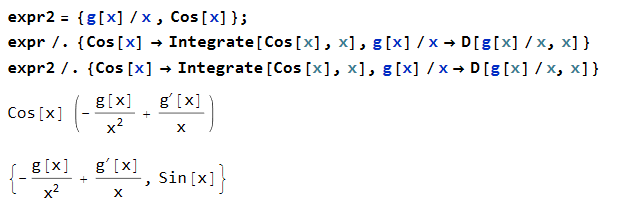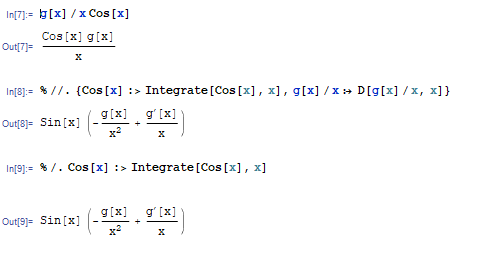Please explain why in the following mathematica code, the cos term was not replaced in the first try, but got replaced in the second try?
g[x]/x Cos[x]
% /. {Cos[x] -> Integrate[Cos[x], x], g[x]/x -> D[g[x]/x, x]}
% /. Cos[x] -> Integrate[Cos[x], x]
Following is the output I am getting
(Cos[x] g[x])/x
Cos[x] (-(g[x]/x^2) + Derivative[1][g][x]/x)
Sin[x] (-(g[x]/x^2) + Derivative[1][g][x]/x)
What I tried:
The following code gives expected result
g[x] Cos[x]
% /. {Cos[x] -> Integrate[Cos[x], x], g[x] -> D[g[x], x]}
Output:
Cos[x] g[x]
Sin[x] Derivative[1][g][x]
I guess the 1/x factor is messing something up?
Extra points: Now, the following code (using :> instead of ->) does not work
g[x]/x Cos[x] /. {Cos[x] :> Integrate[Cos[x], x],
g[x]/x :> D[g[x]/x, x]}
Next, the following code each work. First, as suggested by @edinorog2196
, using g[x] -> x D[g[x]/x, x] instead of g[x] -> x D[g[x]/x, x] works
g[x]/x Cos[x] /. {Cos[x] -> Integrate[Cos[x], x],
g[x] -> x D[g[x]/x, x]}
Also using ReplaceRepeated (//.) (suggested by @BobHanlon and @RolandF) works, irrespective of using :> or ->:
g[x]/x Cos[x] //. {Cos[x] -> Integrate[Cos[x], x],
g[x]/x -> D[g[x]/x, x]}
g[x]/x Cos[x] //. {Cos[x] :> Integrate[Cos[x], x],
g[x]/x :> D[g[x]/x, x]}



ReplaceRepeated(//.) instead ofReplaceAll(/.) $\endgroup$1/x // FullFormgivesPower[x,-1]$\endgroup$g[x] -> x D[g[x]/x, x]. In my experience it is better to just substitute a single thing rather than an expressiong[x]/xwhich could not be found in the code (you have(Cos[x]g[x])/x) $\endgroup$Replacedocumentation explains that when a list of rules is given, the result with the first rule that applies is returned. Your expected result is given byReplace Repeated, which repeatedly performs replacements until the expression no longer changes. $\endgroup$